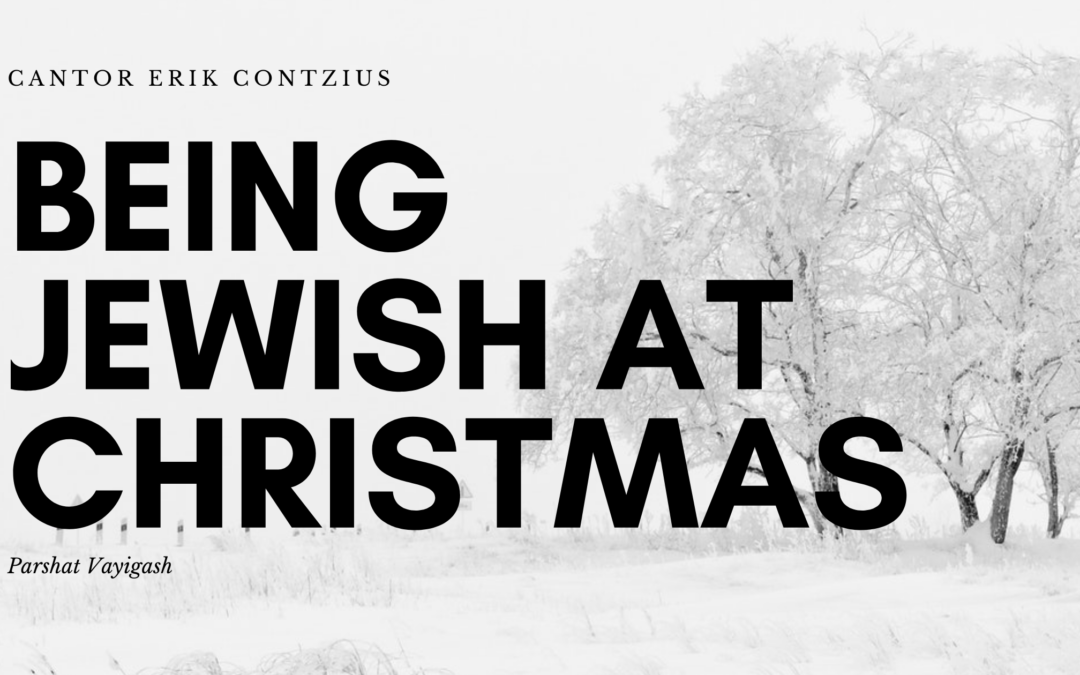Parshat Vayigash – Sermon for December 25, 2020
Identifying as American Jews, there is probably no other time during the year that we feel like a religious minority than the Christmas season. Whether it’s the Christmas lights that appear on neighborhood houses, music heard in shopping malls starting around Thanksgiving (at least before Covid), or hearing “Merry Christmas” at check-out, it is no secret that virtually the Western world is made up of a majority of people who celebrate and embrace Christmas as a religious or cultural holiday with great enthusiasm. Despite living in a country founded on a bedrock principle of the separation of Church and State, with over 65% of those in the United States identify as Christian, compared to around 2% who identify as Jewish, there has not been a time in our country’s history without some overt observance of Christmas.
Jewish identity has been inextricably linked to identifying as a minority. In fact, this week’s Torah portion of Vayigash gives us the origin story for our minority status. Leading up to this week’s reading, you may recall that Joseph, one of the sons of the patriarch, Jacob, had become second in command of Egypt, only subordinate to Pharaoh. He became so after interpreting Pharaoh’s dreams, predicting years of great harvests, followed by years of famine. When the famine hit, the entirety of the incipient Jewish family, living in Canaan at the time, traveled to Egypt in order to find food and sustenance. At the dramatic height of this week’s Torah portion, with his brothers before him, unknowing that it is Joseph they are pleading with, we read from Genesis 45:1-5:
Joseph could no longer control himself before all his attendants, and he cried out, “Have everyone withdraw from me!” So there was no one else about when Joseph made himself known to his brothers. His sobs were so loud that the Egyptians could hear, and so the news reached Pharaoh’s palace. Joseph said to his brothers, “I am Joseph. Is my father still well?” But his brothers could not answer him, so dumbfounded were they on account of him. Then Joseph said to his brothers, “Come forward to me.” And when they came forward, he said, “I am your brother Joseph, he whom you sold into Egypt. Now, do not be distressed or reproach yourselves because you sold me hither; it was to save life that God sent me ahead of you.
Genesis 45:1-5
“It was to save life that God sent me ahead of you.” From first glance, it looks like Joseph is saying that the circuitous path which landed Joseph his station in Egypt, and further brought the rest of his family into Egypt was to save their immediate lives from starvation and inevitable death. However, there are many rabbis who suggest that there is a deeper meaning to the phrase, “it was to save life that God sent me ahead of you.”
The subsequent events of the Torah tell of the Hebrews, now settled in the land of Egypt, prospered and lived well among the Egyptians, and their numbers grew. The book of Exodus continues the story by almost immediately telling us that, starting at Exodus 1:8: “A new king arose over Egypt who did not know Joseph. And he said to his people, ‘Look, the Israelite people are much too numerous for us. Let us deal shrewdly with them, so that they may not increase; otherwise in the event of war they may join our enemies in fighting against us and rise from the ground.’” We then have the story of the Passover, the Jewish departure from Egypt, and eventual following Moses through the desert to Mount Sinai where the Jews are given the Torah.
When Joseph says, “it was to save life that God sent me ahead of you,” the implication is that the direct object “you” refers to all of us: Without the common experience and legend of being treated as the “other,” and conversely, without the common revelation of the redeeming power of the Divine, we would not have the firm identity that would sustain us, nor the strongly held values that makes us empathetic towards the stranger. One of the greatest commandments of the Torah is from Leviticus 19:18: “Love your neighbor as yourself.” for which the justification is from Exodus 23:9: “You shall not oppress a stranger, for you know the feelings of the stranger having yourselves been strangers in the land of Egypt.” None of this could have happened while living as a majority population in the land of Canaan. Thanks to Joseph and his family entering and dwelling in Egypt, we developed the identity we embrace today: Ours is a religion that understands the stranger because we were and continue to be a minority wherever we find ourselves in the world.
In modernity, our Judasim has evolved and changed some of its attitudes towards this minority identity. Without getting into its history or reasoning, Jews in the United States have enjoyed to a great degree a flexibility in embracing our dominant American culture. To illustrate the point through the lens of Christmas, some signs of Jewish aculturation are the elevation of the significance of Hanukkah to Christmas, the exchange of presents at this season, hanging Hanukkah lights, some putting a Hanukkah Bush in their homes in lieu of a Christmas tree… These are all signs of the “success” of America as a “melting pot.” If you’ve heard the metaphor before, you might be surprised to learn that the term came into popular use from a play written in 1908 by Jewish author, Israel Zangwill, who envisioned a society where all could live free from cultural divide or prejudice.
Just to talk about the Chrismas season some more, there have been many Jews who have contributed to the “most wonderful time of the year” by penning some of the more iconic Christmas tunes that we’ve been humming for the past few weeks:
The light-hearted and somewhat irreverent songs, “Rudolph the Red-Nosed Reindeer,” “Rockin’ Around the Christmas Tree,” “A Holly, Jolly Christmas,” and “Silver and Gold” were all written by Johnny Marks, an affluent Jew from Mount Vernon, New York. There are several sources that suggest that Rudolph, co-written by another Jewish writer, Robert Louis May, represents the feelings of some Jews towards the stereotype of the Jew with a large nose!
“The Christmas Song” which begins, “Chestnuts roasting on an open fire…” was penned by Mel Tormé, who was born to Polish Jewish immigrant parents. Joan Javits and Phil Springer, both Jewish composers, gave us the slightly racy song, “Santa Baby,” while two other Jewish writers, George Wyle and Eddie Pola, wrote the classic, “It’s the Most Wonderful Time of the Year.” Ray Evans and Jay Livingston wrote a piece originally called “Tinkle Bells,” but was quickly changed to “Silver Bells,” and has since become a classic. Felix Bernard co-wrote “Walkin’ in a Winter Wonderland” with his colleague, Richard B. Smith, who was not Jewish.
And of course, this list would not be complete without a work written by Russian born Israel Beilin, whose name changed to Baline and then finally to Irving Berlin, who wrote the timeless song, “White Christmas.”
Why have so many Jewish writers contributed to the canon of classic Christmas songs? Writer for the website Kveller, Maddy Albert, wrote recently:
…there are a few theories about why Jews threw their weight behind Christmas songs. As singer and pianist Michael Feinstein, known as the “Ambassador of the Great American Songbook,” told Religion News Service, Jews flocked to the music industry early in the 20th century — when most of the American Christmas classics were written — because it was one of the rare industries in which Jews didn’t face rampant antisemitism. Rabbi Kenneth Kanter, an expert in Jews and pop culture at Hebrew Union College, added that this embrace of Christmas music was a type of assimilation to America’s dominant Christian culture as well as a form of patriotism for Jewish composers. “These songs made Christmas a kind of national celebration, almost a patriotic celebration,” he said.
For much of Jewish spiritual history, Jews, isolated from assimilation and dominant cultural influences, were by and large cloistered away from cultural Christian influences. Today, more than at any time in Jewish experience, we are more than simply exposed to world cultures and religions—we are very much enmeshed with them. The Reform movement itself was created in the United States as a response to the desire to aculturate, to become both fully American and authentically Jewish, embracing the universal values of our relgion while casting aside the trappings of our practices that kept us separate and apart in society. Of course, there are influences both outside and inside our community that keep us identifiably separated, but our Reform ideology fully embraces the idea of reforming our religious expressions so that we might integrate into society instead of separating from it.
This wasn’t clear to me as a child, even growing up at a Reform synagogue in New Jersey. I felt the overwhelming presence of Christmas around this season, and I recall how uncomfortable it made me feel: Excluded and reminded that I was not a part of the majority. Choir performances filled with Christmas songs both irreverent and religious in my public school only underscored that sense. As I’ve gotten older and understood the beauty of our Reform movement in its ability to grow and progress with society, I’ve come to appreciate other religions and cultures in ways that no longer feel like a threat to my Jewish identity.
Today, the Christmas season can be a reminder to us that because we are different, we are adding something to our society ensuring it isn’t monolithic. Our Judiasm itself allows for people from disparate backgrounds, cultures, races, genders, sexual orientations, genders, can gather together and struggle to find meaning and purpose in life. At the same time, we can stand alongside Christians, Muslims, Hinus, Sikhs, people of varied religions and people without faith traditions, appreciate the diversity in our country and how that diversity can make for a better world. Without differences of opinions, viewpoints, values and goals, we can easily find ourselves living in a stagnant world which never challenges the status quo nor strives to improve the fate of all life.
So we can share this Chirstmas Day with Shabbat, look the Sabbath candles glowing before us as a reminder of the light we wish to bring into the world, and look at the Christmas lights in our neighborhood and see them as a sign of those around us who, too, are looking to bring more light into a darkened world. May the Earth know soon and in our days, the light of friendship and fellowship, and may we all know true peace—where all can celebrate differences and still call ourselves one human family.
Kein y’hi ratzon—May this be God’s will. Amen.
 Copyright secured by Digiprove © 2020 Erik Contzius
Copyright secured by Digiprove © 2020 Erik Contzius 

